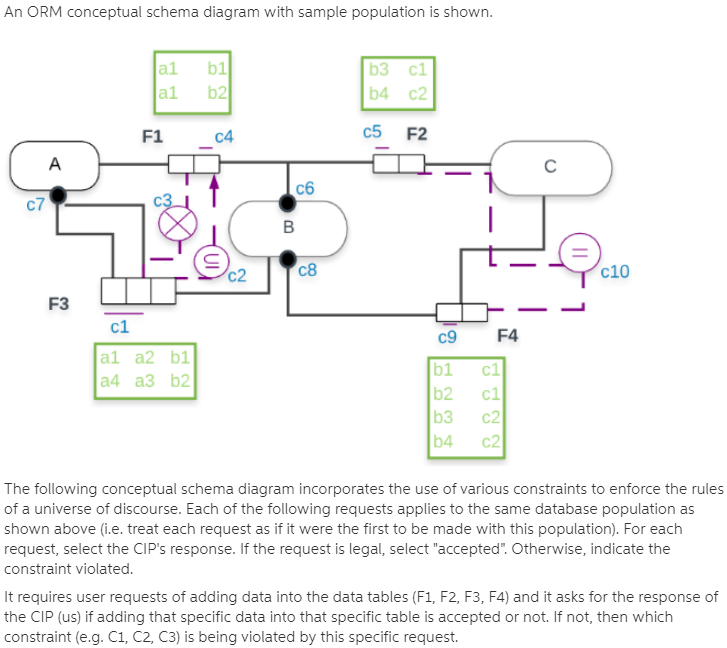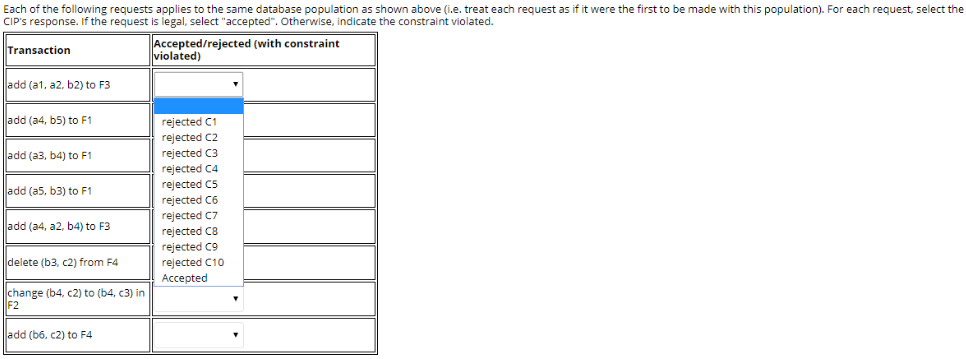


An ORM conceptual schema diagram with sample population is shown. a1 b1 b3 c1 b4 c2 b2 a1 c5 F2 F1 c4 A c6 c7 B c8 c10 c2 F3 c1 F4 c9 al a2 b1 a4 a3 b2 b1 c1 c1 b2 b3 c2 64 c2 The following conceptual schema diagram incorporates the use of various constraints to enforce the rules of a universe of discourse. Each of the following requests applies to the same database population as shown above (i.e. treat each request as if it were the first to be made with this population). For each request, select the CIP's response. If the request is legal, select "accepted. Otherwise, indicate the constraint violated. It requires user requests of adding data into the data tables (F1, F2, F3, F4) and it asks for the response of the CIP (us) if adding that specific data into that specific table is accepted or not. If not, then which constraint (e.g. C1, C2, C3) is being violated by this specific request. Each of the following requests applies to the same database population as shown above (i.e. treat each request as if it were the first to be made with this population). For each request, select the CIP's response. If the request is legal, select "accepted". Otherwise, indicate the constraint violated Accepted/rejected (with constraint violated) Transaction add (a1, a2, b2) to F3 add (a4, b5) to F1 rejected C1 rejected C2 rejected C3 rejected C4 add (a3, b4) to F1 rejected C5 add (a5, b3) to F1 rejected C6 rejected C7 rejected C8 rejected C9 rejected C10 Accepted add (a4, a2, b4) to F3 delete (b3, c2) from F4 change (b4, c2) to (b4, c3) in F2 add (b6, c2) to F4 If possible, give a brief explanation as to how the answer is correct. Thanks! An ORM conceptual schema diagram with sample population is shown. a1 b1 b3 c1 b4 c2 b2 a1 c5 F2 F1 c4 A c6 c7 B c8 c10 c2 F3 c1 F4 c9 al a2 b1 a4 a3 b2 b1 c1 c1 b2 b3 c2 64 c2 The following conceptual schema diagram incorporates the use of various constraints to enforce the rules of a universe of discourse. Each of the following requests applies to the same database population as shown above (i.e. treat each request as if it were the first to be made with this population). For each request, select the CIP's response. If the request is legal, select "accepted. Otherwise, indicate the constraint violated. It requires user requests of adding data into the data tables (F1, F2, F3, F4) and it asks for the response of the CIP (us) if adding that specific data into that specific table is accepted or not. If not, then which constraint (e.g. C1, C2, C3) is being violated by this specific request. Each of the following requests applies to the same database population as shown above (i.e. treat each request as if it were the first to be made with this population). For each request, select the CIP's response. If the request is legal, select "accepted". Otherwise, indicate the constraint violated Accepted/rejected (with constraint violated) Transaction add (a1, a2, b2) to F3 add (a4, b5) to F1 rejected C1 rejected C2 rejected C3 rejected C4 add (a3, b4) to F1 rejected C5 add (a5, b3) to F1 rejected C6 rejected C7 rejected C8 rejected C9 rejected C10 Accepted add (a4, a2, b4) to F3 delete (b3, c2) from F4 change (b4, c2) to (b4, c3) in F2 add (b6, c2) to F4 If possible, give a brief explanation as to how the answer is correct. Thanks









